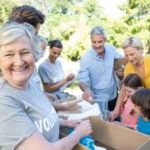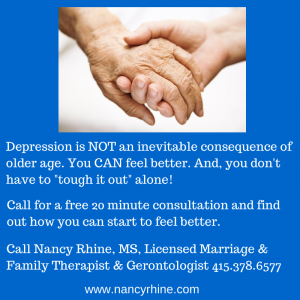depression
Concerns of Some Elders About Our Country
 Many of my older clients – particularly I am finding that this is true for those in their 80’s – are increasingly concerned about the vitriol and divisiveness in our country. They are educated, informed longtime pillars of their communities and they wonder aloud, what is happening here, how can this be happening?
Many of my older clients – particularly I am finding that this is true for those in their 80’s – are increasingly concerned about the vitriol and divisiveness in our country. They are educated, informed longtime pillars of their communities and they wonder aloud, what is happening here, how can this be happening?
One of the things that some of them have in common is that they are not decades long users of social media.
None of us are, really, but some of us are more steeped in what can happen behind the scenes in technology that affects what people see online, and therefore start to think. The power of the media has grown as 24/7 one-view cable news channels have come about and proliferated. And, with the increased possibility of “trolling” online in venues such as Twitter and Facebook, and what we know about the increased capability of hackers around the world to invade systems, we are now experiencing a time of mass confusion and frustration.
 It can be helpful to understand the gravity of these hacker onslaughts against supposedly secure systems.
It can be helpful to understand the gravity of these hacker onslaughts against supposedly secure systems.
One of my clients who is 85 and a former professor at Ivy League schools does not have experience thinking about hackers. As a former techie and internet executive, I clearly remember how intricate the hacking capability was back a few years ago. It has only advanced since then. I also remember how our governmental entities lagged behind in their knowledge and understanding of this phenomenon which left them vulnerable to break ins.
Since social media use is a big element of what is going on in terms of steering public opinion, I have found it’s helpful to some of my older clients that I discuss this with them so that they can understand a little more and get some additional answers to the dilemmas they see in our politics and population.
They are members of what many of us still call “the greatest generation” so it is a responsibility, in my opinion, to help bring them up to speed on some of this, if they are asking and expressing concern.
They also remember terribly dark times of the Great Depression, World War II (some having lived in Europe during Nazi occupation of their countries), the Korean War and more. Their voices of experience and stories need to be heard and valued. And, where possible, some of their perspectives broadened now by explaining some of the ins and outs of technology.
This is intergenerational help and healing. We need all of us now more than ever.
The Three P’s: Pride, Pleasure & Purpose
The Three P’s: Pride, Pleasure and Purpose
A Simple Guide for How to Avoid Chronic Depression in Older Life
 Recently a colleague told me about the “three P’s” which she teaches in workshops to older people. It’s such a simple yet helpful mantra to guide you in finding balance. Finding balance is one of your key developmental tasks in life, and especially so in older anastrozole years. Balance can help you avoid falling into chronic depression.
Recently a colleague told me about the “three P’s” which she teaches in workshops to older people. It’s such a simple yet helpful mantra to guide you in finding balance. Finding balance is one of your key developmental tasks in life, and especially so in older anastrozole years. Balance can help you avoid falling into chronic depression.
Older people are balancing provimed the combination of all of the life lessons they’ve been through, hopefully getting to some “wisdom” on and off at this point. Wisdom meaning, according to Joan Erikson PhD’s research a few years ago, “to know how to”.
They are balancing their anabolicstation.com growing needs for exercise, healthy eating, enough sleep, enough friends, enough mental stimulation, enough fun of various sorts that feeds their souls, enough contribution to the greater good, etc.
Which brings me back around to the “three P’s”. I would say that the Pride part is something a lot of my clients feel pretty good about. They are oftentimes proud of their careers or their families, or their contribution to others. The Pleasure part is, on the other hand, something they are figuring out and beginning to understand they need more of. That pleasure is critical in helping them find enjoyment in older years because it helps balance out the increasing number of challenges inherent in aging. Sometimes we brainstorm about what used to give them pleasure, what gives them pleasure now, and what they might like to try in the future given their capabilities at this point in their lives.
Pleasure is usually connoted by something that feels good visually, sound-wise, smell-wise, taste-wise and touch-wise. It also encompasses doing new things because the brain loves novelty.
The trick is to find “just enough” like in the Goldilocks story – not too much, not too, not too scary, not too bland. You get the gist.
That brings up the other “P” which is Purpose. This I see as one of the most difficult challenges for older people. Many of my clients have felt clear purpose in their earlier years – e.g. raising their children, helping with their grandchildren, serving on Boards in their communities or doing other volunteer work, working at their careers, being successful in a whole manner of ways.
Now, though, they may not be working their last paying careers. They may not be needed to watch grandchildren who are getting older and more independent. They may not feel able to commit to structured schedules in a volunteer or paid part-time job. They also may feel that they have offered to share their lifetime of accumulated, and valuable knowledge with groups, businesses, organizations, schools, etc. and felt that they were ignored or rebuffed. They feel “adrift”
This brings up the subject, then, of grief. Loss of earlier identities, loss of income, loss of value by others for their wisdom, loss of a clear path, and loss of groups of friends one makes in work-related settings.
However, the way through this, is to first acknowledge this grief. To also acknowledge that we live in an ageist society that does not typically value our elders. Our older people’s voices are too often not sought out, and not listened to, and not respected.
As they educate ourselves about ageism in our society and get support for the grief that all of these aspects engender, they begin to be able to lift their heads up above this and take a look around for where they might have purpose now in their lives.
 Often they come around to asking the questions: Where am I helping someone? Who is in worse or different shape than I am that I can help and who would appreciate some attention? Can I volunteer in a hospital holding preemies, can I volunteer in an assisted living community, how about in a library or a nonprofit thrift shop? Can I volunteer taking care of a pet for someone? Can I visit a home-bound neighbor who is lonely? There are so many people in need in our country and so many understaffed nonprofits trying to help.
Often they come around to asking the questions: Where am I helping someone? Who is in worse or different shape than I am that I can help and who would appreciate some attention? Can I volunteer in a hospital holding preemies, can I volunteer in an assisted living community, how about in a library or a nonprofit thrift shop? Can I volunteer taking care of a pet for someone? Can I visit a home-bound neighbor who is lonely? There are so many people in need in our country and so many understaffed nonprofits trying to help.
The point is not *what* you do, but it’s about your sense of purpose. When you are thanked from the heart by someone for something you do, you get more from the interchange than they do! This is something many volunteers say to be true – that they get more from being volunteers, they think, than the people they help.
someone for something you do, you get more from the interchange than they do! This is something many volunteers say to be true – that they get more from being volunteers, they think, than the people they help.
So, Pride, Pleasure, Purpose. A simple equation, so beautiful in its simplicity and truth.
Why Gerontological Counseling for Older People & Their Families?
Why Does Gerontological Counseling Yield the Most Effective Healing?
If you or your loved one is a senior, the counselor you or she sees absolutely, in my opinion, needs to be up to date on the latest research involving aging.
Take, for example, the topic of brain neuroplasticity and neurogenesis. Why is it critical to know about this when counseling older people? Because, not even 10 years ago in graduate psychology programs around the country, interns were taught that brains decline from age 30 on! That things were was all “downhill” – brain cells wise – from there. The explosion of current, ground-breaking brain research that we’re seeing absolutely refutes this dire and incorrect belief. Not only is that attitude false, it is anti-healing!
Our brains are changing all the time. This is called neurogenesis. It happens until our very last breath. In order to support good brain health, we need to provide some basic tools such as good nutrition, limiting sugar and processed carbs, making sure we get plenty of daily exercise, not smoking, reducing environmental toxins, decreasing stress as much as possible, practicing good mental health habits/practices, staying involved socially with family and friends, making sure we take the appropriate supplements, vitamins and minerals, etc.
When I studied psychology as a graduate student, I learned about Eric and Joan Erikson’s famous Stages of Human Development. They had first published their theories and discoveries when they themselves were very young. As they grew older they realized what the research is showing now. That is, that the years from midlife to 90 years old and up are full of rich experiences, new discoveries, and constant evolution. As Eric and Joan moved through their 60’s, 70’s, 80’s and 90’s, they abashedly apologized for making ill informed assumptions that our brains basically stagnate after a certain age.
Now, I am not saying that our memories or that the way we think doesn’t change. We all experience what is called age-related cognitive change as we grow older. That is most often because we have so much more data in the “hard drives” of our brains! We can also suffer from ill health of various sorts, inflammatory conditions that affect our thinking, the side effects of medications that can impact us negatively, and depression and anxiety that can also cause foggy thinking. It’s important to approach conditions like these from a looking at the whole person approach to see what the underlying root problems may be.
The important thing to realize is that it is wrong to believe that older age inevitably leads to bleak depression and cognitive decline. Rather, we can and do grow into wisdom and the ability to cut through the chaff to the gist of what is needed to thrive. In fact, the root meaning of word wisdom, Joan Erikson wrote, is “to know how to”.
I’ll end by saying that too often I hear therapists say that they see anybody, that people are all the same. I think we may be similar but I know, without a doubt from my years of professional practice and my life experience, that the issues we face in older years are different and often far more complex, multi-layered and nuanced than when we are young. Plus, our American culture adds an often-harmful overlay of ageism to the mix.
Therapy with a gerontological counselor can help you get more quickly to the root of what is happening with you and/or your loved one and is up-to-date on other resources that can help you get the attention, care and healing support you need.
Depression is NOT inevitable in older life.
 Our youth-oriented Western culture seems to tell us that we are all doomed to succumb to debilitating depression as an inevitable part of growing older. This is not true!
Our youth-oriented Western culture seems to tell us that we are all doomed to succumb to debilitating depression as an inevitable part of growing older. This is not true!
Sure, it is true that getting old “ain’t for sissies” as Bette  Davis famously put it. There are a myriad of challenges that confront us. Nobody would argue that! We know what those challenges are – all kinds of changes, losses of various sorts from little things to profound ones, aches and pains, the gamut.
Davis famously put it. There are a myriad of challenges that confront us. Nobody would argue that! We know what those challenges are – all kinds of changes, losses of various sorts from little things to profound ones, aches and pains, the gamut.
But, you can also thrive in later years. It’s about your mindset, your emotional and spiritual practices and your strong support network. The kids called support networks these days, their “posse”. Your posse can be made up of old and new friends, your peers, support group members, family, pets, counselors, trusted doctors and spiritual advisors.
Generally, people like you have an assortment of healthy, tried-and-true coping skills that have gotten you this far in your life. Perhaps now, however, you are encountering an accumulation of situations that tax those skills. It may be time to remember your old skills and to learn new ones. It may likely be time as well to rethink your life’s purpose. Purpose is key to keeping your mood up and your heart content.
What stands in the way? Well, too many times, that old Shame rears its head and tells you that you ought to be able to figure this out on your own, that you ought to be able to just “tough it out” and do it alone or else you’re weak. You can’t burden your children so what to do? As the blue box here says, don’t keep it bottled up inside!
What people often don’t realize is that you are not alone in feeling challenged, stressed, confused, overwhelmed or anxious. These feelings surface when we are going through new phases and transitions in our lives. It’s during these times that it becomes so important to realize you don’t have to reinvent the wheel. There are many practices and tips for how to increase your enjoyment of life in older years.
The important thing is to not give up and figure that just depression goes with the territory. That may be what society tells you, it might be the prevailing attitude. But it is not true. Reach out for help. Counseling and support can turn your life around and help you reclaim your confidence, solid footing and peace of mind. Isn’t it worth a try? What have you got to lose!
Depression & Anxiety Are Not Signs of Weakness

It’s Vital to Recognize Depression in Aging Adults
This is a very good, short article on why it is so important to recognize the signs and symptoms of depression in older people. They may not recognize that they themselves are depressed so it is imperative for caregivers and loved ones to be on the lookout. Undiagnosed depression can lead to isolation and even suicidality. Most cases of depression can be cured. This article is written by an older gentleman who has over 30 years experience working in retirement community and health facility administration. He includes reminders and tips for fighting depression in this article. Recognize Depression in Older People – You May Save A Life
